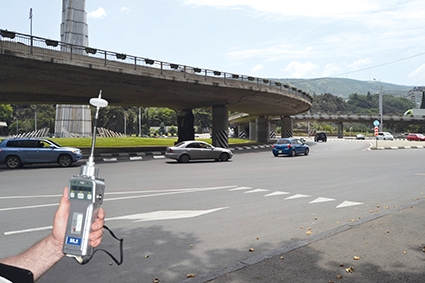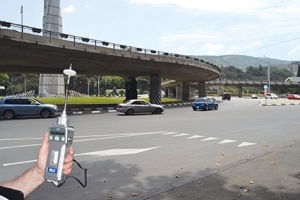NGO EcoVision Presents Recommendations on Tbilisi’s Air Pollution Crisis
On Thuersday, the Georgian environmental non-governmental organization (NGO) EcoVision held a press conference at the Radisson Blu Iveria Hotel in Tbilisi. The aim of the event was to present the results of research conduct by the organization on air quality in the Georgian capital.
EcoVision teamed up with the Committee on Environmental Protection and Natural Resources of the Parliament of Georgia to conduct a study on atmospheric air conditions in Tbilisi.
The main results of the study included the role of dust contamination as a pollutant in the city’s air. They found both a high concentration of dust in the air and a high level of particulate matter. Particulate matter (PM), also known as particle pollution, is a complex mixture of extremely small particles and liquid droplets in the air. They are small enough to inhale without feeling them, and the tiny particles can affect the heart and lungs and have serious health effects – according to the USA’s Environmental Protection Agency. The EcoVision study found high levels of both PM2.5 – particulates with a diameter of 2.5 micrometers or less – and PM10 – with a diameter or 10 micrometers or less.
PM2.5 can be particularly harmful for human health, as they can linger in the air longer than larger, heavier particles, increasing the chance of being inhaled. PM2.5 particles can bypass the nose and throat, embedding themselves deep into the lungs, and some may even enter the circulatory system, reports industry website Bliss Air. Studies published by the American Medical Association have linked increased inhalation of these fine particles to premature death from heart and lung disease, and have found them to be triggers for chronic diseases such as asthma, heart disease, and bronchitis.
Scientists in a study published in the Journal of the American Medical Association estimated that for every 10 micrograms per cubic meter (µg/m3) increase in fine particulate air pollution, there is an associated 4%, 6% and 8% increased risk of all-cause, cardiopulmonary and lung cancer mortality, respectively.
The American Heart Association also warns that “Exposure to...PM2.5 over a few hours to weeks can trigger cardiovascular disease-related mortality and nonfatal events; longer-term exposure (e.g., a few years) increases the risk for cardiovascular mortality to an even greater extent...and reduces life expectancy within more highly exposed segments of the population by several months to a few years.”
The EcoVision study connected high dust concentrations with the city’s many construction sites, which rarely use water to suppress dust – a common practice around the world known to reduce the spread of particulate matter. Throughout the later part of the summer, Tbilisi’s City Hall has been working day and night to renovate many major streets, stirring up constant clouds of dust and debris. Another source of dust identified in the report was the prevalence of bare open ground, particularly in the eastern part of the city and in Kakheti, which sends dust flying with every strong wind.
At the press conference, EcoVision presented several recommendations to prevent air pollution in the capital. First, they recommended introducing and applying EU technical regulations to construction in the city, and dedicating resources for consistent and fair enforcement. Second, intensive planting of trees and shrubbery in the eastern part of Tbilisi to prevent wind from carrying dust from the Iori Plateau in southeastern Georgia into the city. Third, an intensive rehabilitation of streets, sidewalks, and the development of a fountain system throughout the city to improve citizens’ overall quality of life – particularly for pedestrians. Finally, the report noted that the most effective way to reduce vehicle emissions is to restore the technical inspection process, which will come into force in January 2019 for all vehicles, and to improve the conditions of the buses and mini-buses operated by the Tbilisi Transport Service.
Tbilisi Mayor Kakha Kaladze announced a new citywide transport policy in June, which includes replacing the entire bus fleet with modern, cleaner blue buses by the end of 2019, introducing regulations for the taxi industry, introducing vehicle emissions inspections, introducing night transportation routes, and speeding up the metro by adding more cars and reducing the intervals between them.
In July, specialists from the Environmental Pollution Monitoring Department of the National Environmental Agency of Georgia introduced mobile air quality testing stations in 25 locations around Tbilisi, and released preliminary findings, noting that Tsereteli Avenue in the Didube district registered the worst pollution levels in their study, and connected high-traffic areas with high levels of toxic nitrogen dioxide.
By Samantha Guthrie
Image source: EcoVision











